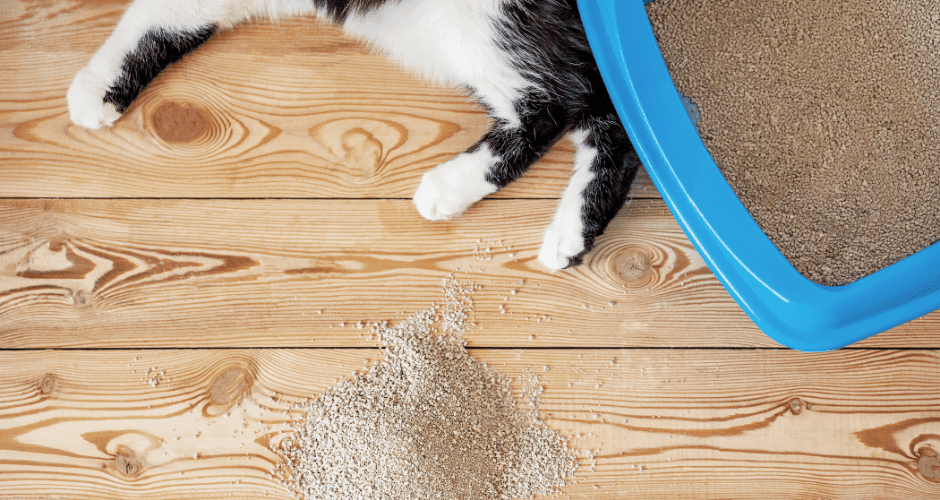Why Is My Cat Peeing Outside the Litter Box? You and your cat are good buddies with a special relationship. You know what to expect from each other. At least you used to know! All of a sudden your cat has been peeing outside the litter box. What’s up with that? In this article, we’re going to examine litter box behavior. After answering your question — “Why is my cat peeing outside the litterbox?” — we’ll provide you with some solutions.
First of all, don’t get mad at your cat! It could be a result of a health problem. Behavioral issues can also show up as peeing outside the litter box, so let’s examine both root causes. Dr. Cathy Lund of City Kitty in Rhode Island says that “Anything that changes a cat’s feeling of wellbeing can create a change in behavior, and in cats, that means litter box habit changes.”
Health Causes For Cat Peeing Outside The Litter Box
First you ask your holistic cat’s vet, “Why is my cat peeing outside the litterbox?” He or she will ask you about details of the problem: how long it’s been going on, how often it happens, if there are changes in eating or drinking habits, and anything else significant. Health causes could include any of the following conditions:
- Bladder or kidney stones
- Bladder or kidney infection (often called “UTI” for “urinary tract infection”)
- Other kidney disorders
- Diabetes and other metabolic disorders
- Pain
How To Collect A Cat’s Urine
Provide ample fresh water and make sure no other pets, including you, are around. Here are a few tips if you don’t have a cat urine collection kit:
- Have a clean medicine dropper and small leak-proof container handy.
- Wash the litter box thoroughly, shake it dry, and return it empty to its usual place. Hopefully, the cat will pee in it without litter.
- Same as above, but add a few shreds of clean paper to make the box more inviting.
- Instead of paper, sprinkle a small amount of non-absorbent litter (yes, there is such a thing!) into the box.
- Double-bag the urine sample in a bag or another container and put it in the refrigerator immediately. Deliver it to the vet’s office within 24 hours or less.
If your efforts are unsuccessful, the veterinary staff is experienced at specimen collection. You may need to leave your cat overnight.
Cat Peeing Outside the Litter Box: Behavioral Reasons
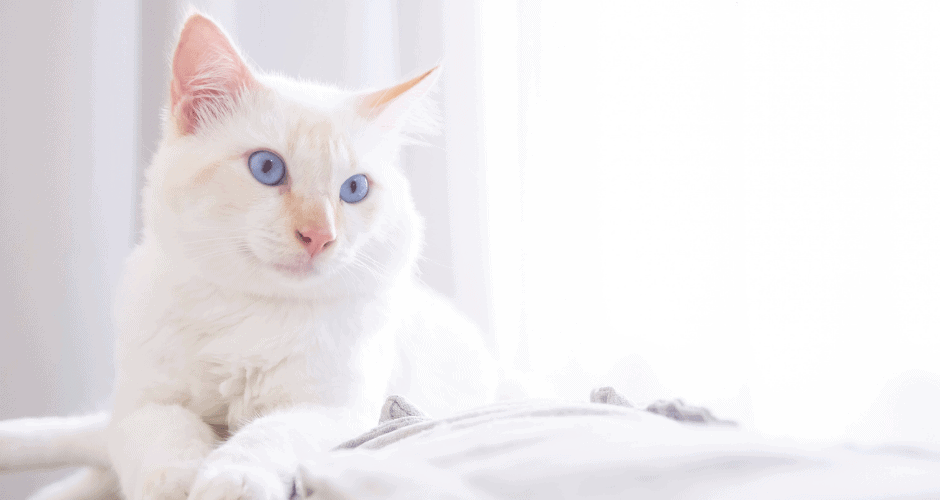
If your cat’s health checks out, then you’re still left asking, “Why is my cat peeing outside the litterbox?” No worries: there are other causes to explore. According to the Only Natural Pet team, “studies have shown litterbox aversion counts for 50% of all cat behavioral issues and is the number one reason for surrender of cats to shelters.”
The Scent of Old Urine
Cats have a very acute sense of smell, so it’s no surprise that they’ve evolved to take advantage of scent as a means of communication. If humans can detect cat urine scent, we often respond with, “Eeewwww!” To your cat, though, sniffing a pee spot is like spending time on social media and it’s natural to want to post back!
Be aware that human attempts to mask the smell don’t remove it. When introducing a new cat to your home, ALWAYS start with a new box and clean litter. As a matter of fact, if you have multiple cats, it’s a good idea to periodically replace the old litter box with a new one. Imagine how you feel sharing the same toilet all the time with other people, especially if it isn’t clean!
Stress Due to Change
Some cat whisperers believe that anxious cats might find the scent of their own urine comforting to be around because it’s familiar. It reinforces their sense of security that they’re on their own turf without invaders and challengers. Consider how it feels to be a cat: you feel safe in familiar surroundings because you know what to expect.
If you’re suddenly transported to a different setting, you don’t know whose turf you’re on, you no longer know what threats await you, and you don’t know where it’s safe to hide. If you’re able to put yourself in your cat’s shoes, you can better understand the reasons for certain behaviors.
WONDER WHAT THE IMPORTANCE OF DIET IS ON HEALTH
Cat Communication With Humans
Among each other, cats use scent and body language as communication. The more you interact with your pet, the better you’ll be able to “converse.” The other thing to remember is that they are predators; their world focuses on prey, territory, and the safety of their young. You and your cat aren’t fluent in each other’s languages, so it’s natural for both of you to attempt to find creative ways to send messages to each other.
Cat urine is an alphabet! The smell, the location, the concentration, and the frequency all provide information. By now you realize the answer to your repeated question “Why is my cat peeing outside the litterbox?” Your cat is trying to tell you something very specific!
Why Is My Cat Peeing Outside The Litter Box But Pooping Inside
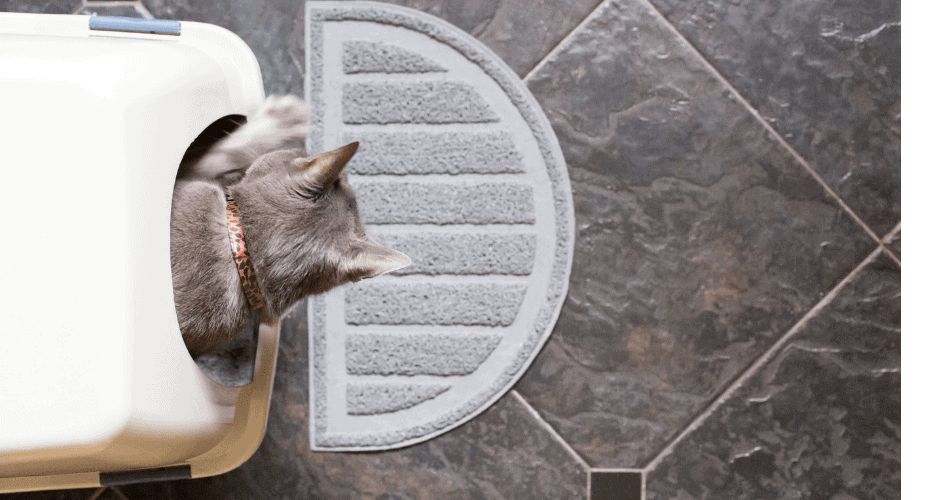
Instead of asking “Why is my cat peeing outside the litterbox?” maybe you’re fine-tuning your question. Urine marking is often communication in response to territorial triggers such as a household move or the presence of a new animal. Since urine has a much more powerful scent, pooping is usually just for elimination. Most cats bury their feces, which greatly decreases the scent. Burying it also minimizes the chance of spreading intestinal parasites to other cats and kittens in the colony.
Why Is My Cat Peeing Everywhere All Of A Sudden?
If it’s not due to a new health problem such as a UTI, sudden new peeing everywhere might be caused by a new cat in the household or the neighborhood. A new pet of any kind might trigger territorial behavior to announce the true owner of the turf. Another cause might be the tension of separation anxiety.
Why Is My Cat Peeing Outside The Litter Box At Night?
Again, consider the situation from your cat’s point of view. What is different at night? Try cleaning the litter box right before bed. Pay attention to what kinds of sights and sounds are present at night but not during the day. And vice-versa. Maybe another pet is bullying your cat at night when you’re not awake to stop it. Maybe your cat needs a night light. Provide a new litterbox in a different location and watch what happens.
What Is My Cat’s Opinion Of The Perfect Litter Box
Cleanliness: Cats prefer a large, uncovered box in a sheltered spot with room to turn around as well as to bury their leavings. Large or exceptionally fluffy cats don’t appreciate being cramped any more than you do in a tiny bathroom, especially if more than one cat uses the litterbox. You’ve heard the saying about someone acting as though their poop doesn’t stink; with such sensitive noses, cats definitely have opinions about what stinks! Scoop daily or more often – compare it to flushing your toilet.
If you use a mat around the litter box, sweep it often and wipe it down as needed. Do a monthly scrubbing of the litter box with a gentle cleanser. Strong chemicals are unpleasant to cats, often even toxic. Bleach, for example, when combined with the ammonia in urine, releases poisonous gas!
Location, Location, Location
Location, location, location: Find a quiet spot, away from food and water, that provides a privacy screen of some kind. Your cat looks to you for safety, though, so don’t isolate the box in a place where they might feel cut off from you or trapped. There should be no disturbing or sudden noises nearby. The litter box should be easy to find, especially for a cat who has arthritis or impaired vision. A box on each level of the home is ideal.
The right litter: Just as chefs and wine connoisseurs discuss mouthfeel as part of the tasting experience, cats would discuss “pawfeel” with you if they could. Kittens start learning about pawfeel from their mothers when they’re about three weeks old. Clay litters, ground corncobs, and shredded newspaper all feel very different to sensitive cat paws. Some cats can be induced to switch after gradually mixing a new kind of litter with the familiar, but others will simply seek a new toileting spot.
ONE LITTER BOX PER CAT!!!
Vet recommendations: One box per cat; more is better because some cats include litter boxes in their territorial claims. Leave clay and crystals in the past and choose natural litter. A few cats like to use one box for pee and another for poo. Remember to scoop, scoop, scoop!
A happy life outside the box: Cats need playtime, stimulating toys, hideyholes, places to climb, and windows for watching the goings-on. And they definitely need your love and attention.
Ways To Reinforce Training
All of us need reminders and brush-up training, and cats are no exception. If you have kittens or feral cats around, you’ll find it beneficial to reinforce litter box training. NEVER punish a cat for peeing or pooping outside the litterbox. Yelling, spanking, or rubbing their nose in their waste will break the bond of trust you share. Providing frequent gentle reminders of the location of the clean litter box will be much more effective. You can also leave a bit of fresh poo and a urine-soaked piece of paper towel on top of fresh litter to create a scent message.
How Do I Clean Invisible Pee?
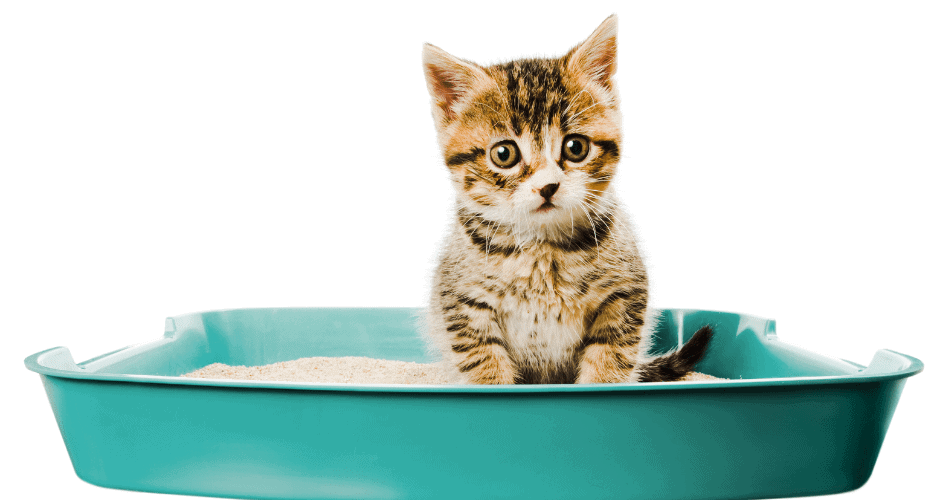
On a garment with a fresh stain, rinse well with cool water. Add a cup of baking soda or a quarter cup of apple cider vinegar before machine washing. Repeat with an enzyme cleaner if you can still detect the smell. Dry without heat to prevent the scent from setting permanently. Don’t forget to wash your laundry basket.
If the stain is on cloth furniture or carpet, use a similar method. Some experienced cat people use a 1:1 solution of water with white or apple cider vinegar (half water, half vinegar) after blotting first with cold water. Repeat as needed. The acid in the vinegar will help offset the odor. You can also sprinkle on baking soda, leaving it for at least an hour before vacuuming. The trick is to neutralize, not deodorize. Here’s another trick: a black light will illuminate invisible urine stains on floors and carpets.
After cleaning and neutralizing, cover urine-marked areas to prevent further use. Place food and water bowls to indicate that the area is for dining rather than toileting. You can also try placing cotton balls soaked in a citrus-scented liquid such as lemon juice or lemon oil as a deterrent. Your vet might suggest other scents that smell good to humans but deter cats from marking.
The Best Litter For Cats Who Pee Outside The Litter Box
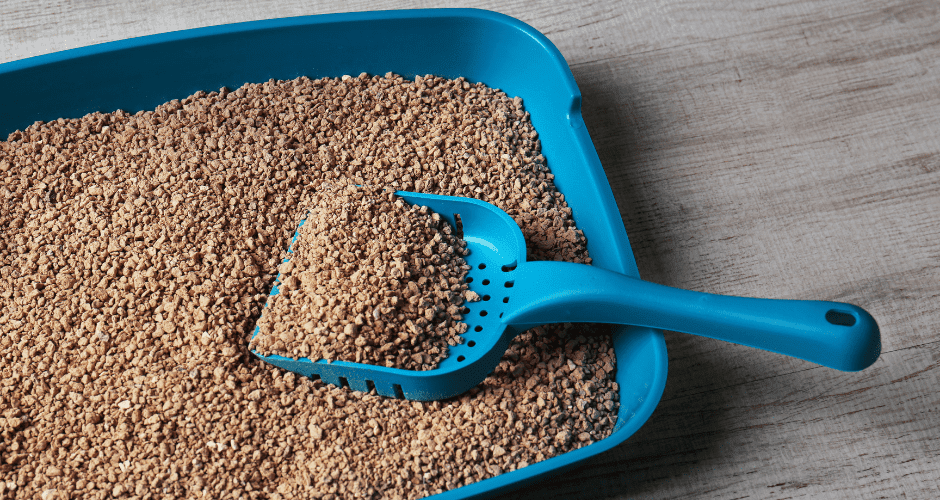
Before we go on, here’s a trivia question for you: Who invented cat litter? Answer: Edward Lowe, back in the 1940s, came up with a way to help a neighbor whose cat was tracking ashes all over the house. Until he came along, people put ashes, sand, or dirt in their cat’s boxes.
Consider litter from the feline viewpoint. With their incredible sense of smell, they prefer a clean, natural, unperfumed material for toileting. Baking soda and charcoal additives absorb the scent for humans but not for cats; the best scent control is frequent scooping. Cats also like something comfortable that doesn’t kick up dust when they paw through it.
Rule out clay and crystals. Clay is cheap but it turns gluey when wet. In addition to being dusty, clay often contains silicates which are bad for the respiratory system. The dust clings to fur where it later is licked off and swallowed, later leading to digestive problems. Crystal litter contains sodium silicate, the same chemicals labeled “DO NOT EAT” in little packets meant to absorb moisture. The crystals are also hard and sharp on tender paws.
Here are some natural, biodegradable litter ingredients you’ll want to look for because they’re better for your cat as well as the environment:
Biodegradable Litter Ingredients
- Recycled corn cobs, kernels, or husks: Usually flushable, dust-free, clumping, absorbent, providing good odor control
- Wheat and other grains: Usually flushable, dust-free, clumping, absorbent, providing good odor control; some pets might find it tasty, though!
- Pine, cedar, and other softwood shavings and pellets: Low dust, absorbent, deodorizing, may be flushable in small amounts; turns to sawdust when wet – often used with a special filter so the sawdust falls below the screen for easy emptying
- Grass seed: Clumps fast and hard, flushable, dust-free, providing good odor control
- Recycled paper: Dust-free, doesn’t stick to incisions or wounds
Remember that the best litter in the world won’t make your cat happy unless you scoop daily. Scoop three times daily! Scoop the litter every time YOU go to the bathroom and your cat will love you!
A Note About Cat Poop
Because cat feces can transmit the bacterial disease toxoplasmosis to water and soil, never flush it. Dispose of it as regular trash. For the same reason, to prevent any risk of contamination, never use any cat litter as compost for edible crops.
Final Thoughts: Now Here’s Your Chance To Play Detective
To quote Sherlock Holmes, “the game’s afoot!” If you don’t know what that means, the famous English detective said those words when he was about to jump to the challenge of solving a mystery! After being informed through this post about cat psychology and behavior, try tuning into your cat by becoming aware of the subtleties. Amazingly, this will help you in every other area of life as life; hence, the conception “Animals are our teachers ~ if we are so willing”.

